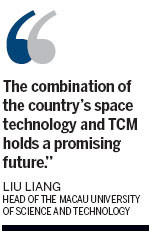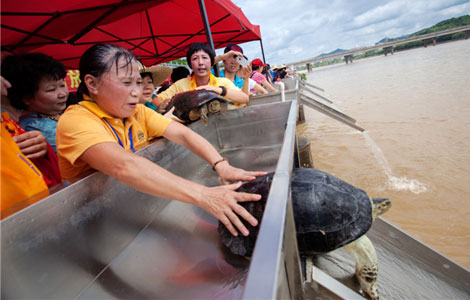

Traditional Chinese medicine may be the latest sector to benefit from cosmic farming as 150 grams of space-exposed ginseng seeds were delivered to a State lab on Friday.
"We hope the space ginseng will be bigger, more resistant to disease and have increased medicinal potency," said Zhou Hua, professor of Macau University of Science and Technology, the State's top research laboratory in Chinese medicines.
 |
The ginseng seeds spent 15 days in space aboard Shenzhou X in June and may take as many as six generations on the ground to show the enhanced characteristics.
Generally, it takes at least five years for ginseng plants to mature.
"Thirty years will be too long for us, so we will nurture the ginseng with a tissue culture technique to shorten the process," Zhou said, without revealing further details.
Although it is the first time ginseng has been sent to space, China has sent vegetable seeds and many traditional Chinese medicine ingredients since the 1980s.
During early experiments, Jiang Xingcun, a scientist at the Chinese Academy of Sciences, discovered that spaceflight can increase mutation rates by a hundred times over what is experienced on Earth.
China has produced giant eggplants, half-meter-long cucumbers, peppers with improved yields and reduced seeds and glossy ganoderma more resistant to diseases, among many other plants.
Scientists say the radiation and micro-gravity in space can cause natural changes to the seeds without involving artificial genetic modification.
Liu Min, a scientist who specializes in seed technology, told China Daily in a previous report that radiation-induced mutation is an widely-recognized, safe way to breed new crop varieties, given the fact that it does not splice any foreign genes into the plants.
Liu Liang, head of the Macau University of Science and Technology, said at a ceremony for the delivery of the seeds on Friday that space germination is opening a new chapter for traditional Chinese medicine.
"The combination of the country's space technology and TCM holds a promising future," Liu said.
Zhang Jianqi, chairman of the China Space Foundation, responded to Liu's hope for the merging of the programs by saying that long-term support and cooperation will be launched in exploring traditional Chinese medicine.







